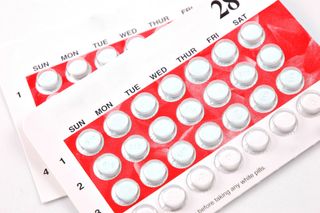Long-Term Birth Control More Effective than the Pill

Women who use long-acting methods of birth control are less likely to wind up pregnant than women who use shorter-term methods, which require daily or monthly remembering, a new analysis says.
The results showed that women using birth control pills, skin patches or vaginal rings were 20 times more likely to have an unplanned pregnancy than women who used intrauterine devices (IUDs) or implants placed under the skin of the upper arm.
"We were surprised at the magnitude of the difference between the contraceptive methods," said study author Dr. Jeffrey Peipert, a professor of obstetrics and gynecology at the Washington University School of Medicine, in St. Louis.
The study, which appears Thursday (May 24) in the New England Journal of Medicine, is one of the largest ever done in the U.S. to compare birth control failure rates over a three-year period, Peipert said. It's also one of the few to include a large number of women using IUDs and implants. Previous studies were based on surveys and depended on women's recall of contraceptive failure, he noted.
Given the findings, Peipert said women and health professionals should consider this question: Would we use a medication that was 20 times less effective for cancer or heart disease?
Unplanned pregnancies
Half of the roughly 6 million pregnancies in the United States each year are unplanned. And of those 3 million, about half are attributed to the incorrect or inconsistent use of birth control.
Sign up for the Live Science daily newsletter now
Get the world’s most fascinating discoveries delivered straight to your inbox.
The unintended-pregnancy rate in the U.S. is higher than in other developed countries, including France and the United Kingdom, where use of IUDs is much higher, the researchers said. The pill remains the most commonly used contraceptive method in the United States.
In the new study, researchers tracked almost 7,500 women ages 14 to 45 considered at risk for an unplanned pregnancy. All women were given the contraceptive of their choice free of charge, and they also received counseling about each method's risks, benefits and effectiveness.
The largest group, nearly 5,800, chose IUDs or implants. Slightly more than 1,500 women selected pills, patches or vaginal rings, and the smallest group, 176 women, chose an injectable form of birth control known as DMPA, short for depot medroxyprogesterone acetate.
During the study 334 unplanned pregnancies occurred. Of these, 156 were attributed to contraceptive failure (improper or inconsistent use), The remaining 178 pregnancies were due to other reasons, including the non-use of contraceptives.
The highest failure rate was seen in women using birth control pills, patches or rings. There were 133 pregnancies among women using these methods, which means the failure rate was 4.5 percent. There were 21 women who became pregnant while using IUDs and implants, and two women while using DMPA.
While a woman's method of birth control mattered, her age also made a difference.
Researchers found that women younger than 21 who relied on oral contraceptives, patches or rings had almost twice the rate of unintended pregnancies as older women who used the same contraceptives. That's because younger woman are more likely to forget to take their pills or to change a patch or ring, the researchers said.
Less mental effort is needed for IUDs, which can stay in the uterus for five to 10 years, depending on the type. Implants are effective for up to three years. It's estimated that 5.5 percent of U.S. women who use birth control currently use IUDs.
Making decisions
"This is an extremely well-done study, and I really applaud that the researchers did it," says Dr. Lynn Goltra, an OB/GYN who is director of family planning at Massachusetts General Hospital in Boston. "It shows that the failure rate is 20 times higher for labor-free birth control methods than labor-intensive ones."
In other words, the more effort a woman has to put into a birth control method, the more likely it is to fail.
Goltra, who was not involved in the research, said women under-utilize IUDs. "They're hassle-free, incredibly safe, and as effective as sterilization," she said.
Some women don't like the idea of placing something foreign inside their body or under their skin, Goltra said. There are also risks to using IUDs, she noted; for example, there's a very small risk of introducing an infection into the uterus that might affect fertility, and skin implants may cause unpredictable bleeding.
It also may be that women are less familiar with long-acting birth control methods, and they hear less information about them from their friends.
"If a woman's goal is to prevent pregnancy, she should be using the most effective method of birth control," Goltra said. "Long-acting reversible contraceptives are the most effective."
Pass it on:The use of long-term contraceptives, which require little daily thought, shows a significant higher success rate in preventing pregnancies.
Follow MyHealthNewsDaily on Twitter @MyHealth_MHND. Find us on Facebook.
Cari Nierenberg has been writing about health and wellness topics for online news outlets and print publications for more than two decades. Her work has been published by Live Science, The Washington Post, WebMD, Scientific American, among others. She has a Bachelor of Science degree in nutrition from Cornell University and a Master of Science degree in Nutrition and Communication from Boston University.
Most Popular


